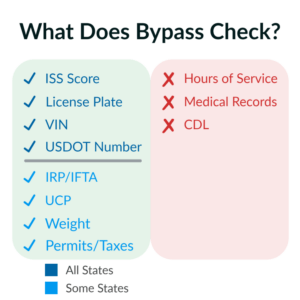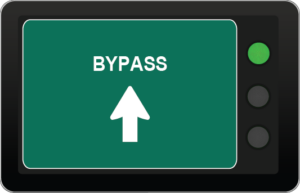Inspections
ISS Score Explained – And Where You Can Find Yours
December 13, 2017
Modified on January 31, 2023
What’s an Inspection Selection System (ISS) Score?
When reading or hearing about weigh station bypass programs, you may have learned that a carrier’s “ISS score” plays a role in determining whether a truck will receive a bypass command or not. Many think a carrier’s ISS score is the same as a carrier’s CSA scores, and although there is a relationship between them, they are not the same thing.
“ISS score” stands for Inspection Selection System score, and was developed by the Federal Motor Carrier Safety Administration (FMCSA) to help roadside commercial vehicle enforcement officers make quick decisions on whether or not a truck should be inspected. Rather than having an officer look up numerous CSA measurements for a given carrier, to aid in truck inspection screening, the ISS score method uses a formula to amalgamate the various safety measures into a single score between 0 and 100. The FMCSA provides recommendations on whether an officer should occasionally inspect, always inspect, or rarely inspect a vehicle, depending on where the carrier’s ISS score lies in the 0 to 100 range. Like golf, a lower score is better. So the ISS is above all a decision-aid for commercial vehicle roadside vehicle safety inspections.
But with the advent of both transponder-based and GPS/internet-based weigh station bypass services, like Drivewyze PreClear, ISS scores have also become a means by which state law enforcement agencies can automatically screen incoming trucks in order to provide them with bypass commands or pull-in instructions. When a truck that is enrolled in a bypass service approaches a participating inspection site, the bypass service typically looks at the carrier’s ISS score, along with registration status, IFTA status, weight measurements from any embedded weigh-in-motion (WIM) scales, and other measures, to determine the rate at which a given truck will be given a green light bypass command. Just as officers use a carrier’s ISS score at the station to determine the likelihood of performing an inspection, bypass services like Drivewyze check it to determine the rate at which a truck needs to pull in at all. Enrolled trucks with an outstanding carrier ISS score may be told to pull in only 2% of the time, while those with a poorer carrier ISS score may need to pull in 25%, 40% or more of the time.
The ISS score is calculated from a carrier’s Behavior Analysis and Safety Improvement Categories (BASICs) percentile values, as recorded in the FMCSA’s CSA Safety Measurement System (SMS). This alphabet soup of scoring systems is essentially the way the FMSCA tracks the safety records of carriers in the areas of unsafe driving, crash indicators (history of crash involvement), driver fitness, hazardous materials (HM) compliance, vehicle maintenance, hours-of-service compliance and controlled substances and alcohol. The ISS method is simply a way to gather up all of the BASIC measurements into a single, at a glance score.
In cases where a newer carrier may not have the history from which to accumulate a BASIC score, the ISS score is determined through the use of an ‘Insufficient Data Algorithm’, which is used until there is enough data to bring the carrier into the BASIC safety measurement system. This link gives a very in depth breakdown of how these scores are calculated: https://ai.fmcsa.dot.gov/sms/helpfiles/iss_algorithm.pdf
How to Find Your ISS Score
The FMSCA has set up a portal website where carriers can look up their own ISS score. The website can be accessed here – https://portal.fmcsa.dot.gov/login . If this site has not yet been accessed by a carrier a new account will need to be set up here: https://portal.fmcsa.dot.gov/AccountRequest/AccountRequestForm1.jsp
Once a carrier is able to log into the FMCSA portal, the Inspection Selection System (ISS) Info view displays the company’s ISS score, the resulting ISS Recommendation and the Basis for Recommendation – which is essentially the criteria an officer would follow when determining whether or not to inspect a truck that has already pulled in.
However, this ISS Recommendation information is not the same as the criteria each state follows for granting bypasses. In other words, a Drivewyze enrolled truck that has a poor ISS score may or may not be instructed to pull in, based on the state’s screening rules. A truck with a poor ISS score that is given a bypass instruction will of course not be inspected, since it is being told to stay on the mainline and bypass the station. And trucks that are instructed to pull in are not necessarily being singled out for inspection. Once a truck pulls in, it is up to the officer’s discretion, using the ISS score system and many other criteria, as to whether or not an inspection should take place. Drivewyze does not recommend whether or not an inspection should take place.
It is also important to note that the FMCSA started randomly manipulating ISS scores for carriers – particularly smaller ones – that don’t have enough inspection data registered in the system. By temporarily increasing a carrier’s ISS score, the FMCSA ensures that such carriers are more likely to be pulled in for an inspection, thus satisfying some ongoing data sufficiency problems within the FMCSA model.
This means that a carrier which is lacking in inspection data may therefore be subject to a temporarily high ISS score, so that a sample of that carrier’s trucks can be pulled in, receive clean inspections, and then have that carrier reinstated to a confirmed, lower ISS score.
In this way, a bypass service and the FMCSA’s manipulation of ISS scores make for a self-regulating system. Carriers who are worried that bypassing scales might negatively impact their ISS scores no longer need to do so, and they no longer need to choose whether to use a bypass service or not. Those who participate in a bypass program will be able to enjoy bypasses that reflect their safety scores, and if the FMCSA data model deems it necessary, their ISS scores will be temporarily raised, some trucks will be inspected, and then their good safety scores will be confirmed and reinstated.
How is ISS used for the Drivewyze Bypass Program?
Drivewyze uses a carrier’s ISS score, along with other state specified criteria, to help determine the rate at which an enrolled truck will be instructed to pull in. The pull in criteria for a range of ISS scores is set and managed by each individual state agency, and so varies from state to state and even from site to site.
This allows agencies to balance their manpower availability for pull ins and inspections with the need to achieve the highest safety value. Some agencies may grant bypasses up to 98% of the time for carriers with stellar ISS scores, while reducing the bypass rate to 50% or less for those with poorer scores – or even deciding to pull everyone in for a period of time due an inspection blitz.
Because bypass rates vary from state to state, and change over time, the best way to determine how your carrier ISS score translates into a Drivewyze PreClear bypass rate – on the routes where you operate – is to try Drivewyze for free and see for yourself. Individual drivers can try Drivewyze for free on their smartphones and tablets for 30 days. Carriers interested in using Drivewyze on their in-cab telematics device can receive a free detailed analytics report that shows them what kind of bypasses they can expect to receive and take advantage of a free trial by contacting our customer support.
But all states set a random pull in rate for all vehicles, which means that occasional pull in commands may be given to even the most pristine carriers.

